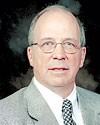Provost George Davis announced yesterday that he will step down from his position at the end of June, surprising many of the colleagues who have worked with him during his seven-year term.
Though he will no longer be the UA’s top education official, Davis said he plans to remain involved in the campus community as a regents’ professor of geosciences.
President Robert Shelton said Davis has been “”absolutely essential”” in helping the university adjust to his new leadership.
“”I just have the highest respect for him,”” Shelton said.
Former president Peter Likins, who hired Davis in 2000, said being provost is one of the hardest jobs at any university. He said he knew Davis would be stepping down eventually, but did not know it would be this summer.
Likins said Davis’ decision is part of a “”natural cycle”” of the university, citing the three years when his provost was Paul Sypherd, appointed by former president Manuel Pacheco, at the start of his time in office.
Davis said he made the decision to step down about two or three weeks ago, and had conversations with Shelton to that effect.
Shelton said he doesn’t have anyone in mind to replace Davis, but he is looking for an ambitious candidate who understands the UA policy of shared governance with the faculty and has impeccable credentials as an academic.
As a professor of geosciences, Davis said he plans to go on a geo-archaeological trip to Mount Lykaion in Greece and complete work on the third edition of his textbook, “”Structural Geography of Rocks and Regions.””
When speaking about his trip to Greece, Davis’ eyes lit up and he became animated, explaining the ancient site of worship and athletic competition with the only known chariot racetrack in all of Greece.
Davis noted that his business card lists the title “”Regents’ Professor”” more prominently than “”provost.””
“”That’s at my core,”” Davis said.
Mary Voyatzis, head of the classics department, said she has taught several classes with Davis and will be going with him to Greece to work at Mount Lykaion.
“”He is the best person to be along with us,”” Voyatzis said. “”He is so fun and full of energy. … We are at our best when he’s around.””
Susan Beck, head of the geosciences department, said Davis is a world-renowned scholar whose text is a widely used resource on structural geology.
Beck said she was excited at the prospect of having Davis back in her department, and she was confident he could resume work as a professor without a problem.
Though technically Davis went on sabbatical in 2000 to take the title of provost, he has continued his work as an academic scholar.
Voyatzis said Davis’ job as an administrator has prevented him from doing fieldwork on the Lykaion project for longer than two weeks at a time, and last year he wasn’t able to go. This year, Davis plans to be in Greece for a month.
Shelton said he asked Davis to give advice on administrative matters from time to time, even after he becomes a member of the faculty.
Jerry Hogle, vice provost for instruction, said Davis had committed to helping the Office of the Provost ease into functioning under the new president, but he had not made any solid commitments beyond this year. Even so, Hogle said he was surprised by yesterday’s announcement.
“”It really hasn’t sunk in yet,”” said Juan Garcia, vice provost of academic affairs. “”I’m still trying to process all this.””
Davis began his career at the UA as an assistant professor of geosciences in 1970 immediately after graduate school.
Likins said he made the decision to hire Davis as provost in 2000 after reviewing Davis’ history as an academic and an administrator, especially his one-year term as president of the University of
Vermont.
According to the University of Vermont Web site, Davis signed on as president in July 1990. He faced a year of escalating racial tensions in the university, including a student takeover of his office and the arson destruction of four shuttle busses, before he resigned in October 1991.
In 1993 he returned to the UA, which he called in his e-mail memo “”the best possible academic home for me.””
An April 25, 2003, article in the Chronicle of Higher Education profiled the professional relationship between Davis and Likins as one in which the two worked in tandem to administer the university, “”trading off”” leadership and completing each other’s thoughts.
“”The years I had with George were just the very best,”” Likins said.
Joaquin Ruiz, dean of the College of Science, said Davis is the one who first hired him as an assistant professor in the early 1980s, when Davis was geosciences department head.
Ruiz said he had nowhere to stay when he first came to Tucson, so Davis let him stay with him for a while.
“”It’s a thrill to work with somebody like that,”” Hogle said, praising what he called Davis’ open mind and big heart.
After praising Davis’ performance, Shelton said: “”These are hard, exhausting jobs, and they take their toll.””
Hogle said Davis was provost during one of the UA’s most tumultuous times, facing massive budget cuts during a 2001 national economic downturn and a new presidency this year.
Also in the last year, more departments, like the offices of Student Affairs and Human Resources, were shifted to the Office of the Provost.
Davis said the only negative aspect of his decision is that he won’t get the opportunity to show the effectiveness of this new system.
Garcia said it is hard to tell the stamp Davis has put on the history of the UA. Taking a line from President Jimmy Carter, Garcia said it mostly depends on who comes after him.
Ruiz said he is excited to have Davis back on as a faculty member, but it’s not going to be a rough transition.
“”We never really lost him,”” Ruiz said.









